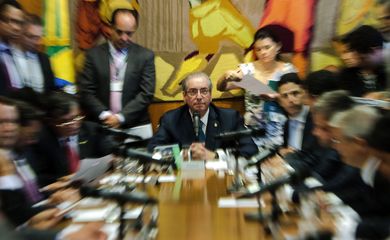Understand impeachment proceedings


Brasília - Lower House Speaker Eduardo Cunha reads the documents on President Dilma Rousseff's impeachment request.

Lower House Speaker Eduardo Cunha decided Wednesday (Dec. 2) to initiate President Dilma Rousseff's impeachment proceedings. Thus, he began a process that may last until next year, and includes collecting evidences, questioning witnesses, and voting in plenary.
The process of impeachment is to remove the president of the republic or some of the highest authority of the executive branch power from their office due to “crime of responsibility”, regulated by Law 1079/50. The lower house is responsible for initiating the proceedings, but the Senate judges the ouster, presided by the Supreme Court president.
Allegations
By law, any citizen can report the president for crime of responsibility to the lower house. The witnesses who are part of the proceedings must be interrogated. Once the allegation is filed, it is submitted to an elected special committee. The committee shall have members representing all the parties of the house, according to the proportionality of each party's bench.
The committee shall meet within 48 hours and then elect its chairman and rapporteur, who will have 10 days to produce the recommendation for the possibility of judging the allegation. Within this period, the committee will take the necessary measures to probe the allegation.
Voting
The special committee's recommendation will be read during a session of the lower house and fully published in the National Congress Journal and in handouts, together with the allegation. Both publications must be distributed to all deputies.
After 48 hours of the publication, the recommendation will be added, in first place, to the agenda of the lower house, for a single discussion. Five representatives from each party may address the recommendation for an hour. The special committee's rapporteur will have the chance to respond each of them.
The recommendation will be put to a roll call vote. If the allegation is considered unfounded, the case is dropped. If not, the allegation moves on, and the president of the republic has 20 days to refute it and to provide evidence to support her defense.
Analysis
After this period, with or without the defense, the special committee interrogates witnesses from both sides and can even hear both the accuser and the accused of the case. They can also undertake inquiries and confrontation. The accused president of the republic may attend all sessions in person or send a representative.
The committee will have ten days after the end of the sessions to produce a new recommendation, analyzing whether the allegation is unfounded or not.

Brasília - In a statement at the presidential palace, President Dilma Rousseff expressed outrage at the decision to accept the impeachment request made by the lower house speaker.
The new recommendation will also be published and added to the agenda of the following plenary session to have two discussions with 48-hour interval between each one. Each party's representative may speak once and for one hour. The recommendation will be put to a roll call vote. For the impeachment request to proceed, two-thirds (342) of the 513 deputies must vote for it.
Indictment
If the allegation is upheld, the lower house will issue the indictment. The president of the republic shall be immediately notified by the board of the lower house. The lower house shall elect a three-member committee to monitor the trial of the accused.
Once the indictment is enacted, the president of the republic has her job suspended and has half her pay cut until the final sentence. She is replaced by the vice president.
Senate
The proceedings move then to Senate, where they will have 180 days to deliberate, with sessions led by the Supreme Court president. If two-thirds of the senators vote to ouster the president, she is removed from the post and the vice president takes office.
Translated by Amarílis Anchieta
Fonte: Understand impeachment proceedings



